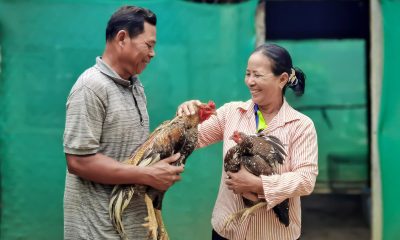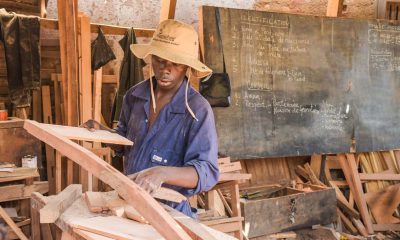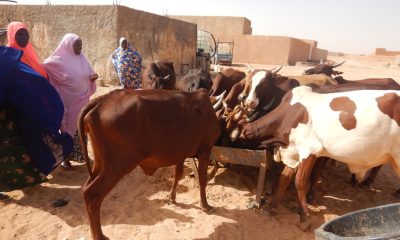In Guidan Gado, Niger, a drought and outdated farming methods have caused starvation and an exodus of young men from the village. Through Raise a Village, Samaritan's Purse hopes to change the lives of these people.
Auta’s skin is dark and taut with valleys of worry and determination etched into her forehead. She is 58, and her husband died three decades ago. She sits on a small rock outside her home in a village in Niger, West Africa, and holds a wiggly granddaughter as she speaks.
Around her, she sees a few men hard at work, trying in earnest to grow food in the dry, sandy soil. Women pound grain if they have any, tree leaves if they don’t. There are not as many people as there used to be. Many have been forced to move away to look for work elsewhere because it is becoming increasingly difficult to survive here.
“Guidan Gado is my village,” Auta said. “I consider this my home because I was born here and my parents were born here and everyone I know is here. It’s not good when people have to leave. You’d like everyone to stay here and be full and be happy, but by necessity people have to leave and that’s the way it is.”
Auta’s words reveal the harsh reality these 1,400 villagers experience each day. Increasingly poor soil quality and insufficient and erratic rainfall over the course of several years, combined with inadequate traditional farming methods, have resulted in a chronic problem of severe food shortages.
The people of Guidan Gado watch as their land grows drier. They sit in excruciating heat, waiting for rains that rarely come. They watch their men leave to find work, to find food. They lay down to sleep with empty bellies for a night, two nights, sometimes more.
Auta pauses in her tale to watch her granddaughter interact with strangers. She smiles. Her eyes betray the difficulty of her life, but the lines around them testify to years of such smiles.
Her face illustrates the great paradox of these people. They live simply and struggle to provide even the very basic necessities for their families. Yet they are also tenacious and resilient. There is still a shadow of joy here.
Samaritan’s Purse has worked in Niger since 2005, when we responded to a severe food security and nutrition crisis. We currently serve the Nigerien people in the sectors of food security, livestock, water, sanitation and hygiene, health and nutrition, and ministry.
Our programs have made a difference in the lives of more than 500,000 people over the years by helping them to provide for their families and break the cycle of poverty. Yet, the initial crisis of hunger and malnutrition remains a very present reality. Today, more than 3 million Nigeriens suffer from severe and moderate food insecurity. Nearly half the nation’s children live in a state of chronic malnutrition.
 These stark statistics are personified in Guidan Gado, in the narrow cheeks of children and the stunted growth of men. The granaries are empty. The fields are fallow. The animals are scarce.
These stark statistics are personified in Guidan Gado, in the narrow cheeks of children and the stunted growth of men. The granaries are empty. The fields are fallow. The animals are scarce.
Samaritan’s Purse ran a 10-day campaign to transform this entire community. Raise a Village was an effort to raise enough money to change the lives of every family in Guidan Gado by improving livestock and food production, giving them the means to pay for the food and medicine they need, and expanding access to clean water. Through God’s faithfulness and the generosity of our supporters, we were able to raise $153,489 to provide for these villagers.
As we work, we will have opportunities to tell people about Jesus Christ and touch lives for eternity.
“Anybody can minister to the physical needs, but to the spiritual needs—to actually bring and restore hope is something only God can do,” said Alan Bobbett, the Samaritan’s Purse country director. “We’re called by Jesus to enter into the suffering of the poor, and we can do that here. We can raise this village and in so doing, we can raise the entire community around it.”
The People of Guidan Gado
To reach Guidan Gado, you drive east from the capital city of Niamey, atop potholed roads and across scorching desert for more than 200 miles. The roads are regularly interrupted by speed bumps that are handmade and plentiful. Each bump marks a location where a child was killed by a vehicle that did not heed villagers moving from one mud hut to another. Twenty-first century traffic flows between family homes that have stood in the red sand for generations, since long before Westerners in Land Cruisers were a common sight.
After reaching the town of Madaoua, vehicles must leave the pavement and traverse rocks and sand for over two hours. Drought is obvious when trucks must switch to four-wheel drive to power through the fine, deep sand of dry riverbeds.
Guidan Gado emerges on a hillside in the desert, with tall trees standing sporadically throughout the village. The heat envelops anyone standing there on the sand, and causes them to immediately begin to sweat.
The air smells sweet and smoky, redolent of the numerous small cooking fires that crackle in the sun. Walls made of mud and thatch frame small family compounds. Women with babies tied to their backs pound millet—a grain friendly to the semi-arid climate—in large wooden mortars, tapping their pestles against the sides between hits in predictable, rhythmic time.
A Samaritan’s Purse team, here to listen to the stories of these people and learn how we can help, is ushered into the chief’s compound. Chairs have been strategically placed beneath the wide branches of an old neem tree. The people have come to welcome the promise of help, the glimmer of hope.

Most of the people in Guidan Gado gathered to greet and to say goodbye to the Samaritan’s Purse team when they visited.
Guidan Gado’s chief is Mahaman Chaibou. Five generations ago, his ancestors established the village because its land was rich for farming. But today, crops provide just enough food for a month or two. The dual water sources outside the village are broken. Drought plagues the land one season after another.
“We are hungry,” Mahaman says, “and that is the main problem.”
We sit down to talk with several women. They speak a language called Hausa. It is a quick-paced and syllabic tongue, with lilting laughter dancing along the edges of words. The women speak over one another in excitement, and their wide smiles mirror our own.
It takes a few minutes to shoo the older children off to school and to shush the smaller ones as they settle into laps. Pots of millet continue cooking in the corner and small chores interrupt conversation throughout the hour. Though we sit in a dirt courtyard outside of a mud hut, the love between the women and the normalcy of a mother’s busy morning is familiar. The scene would not be out of place in an American kitchen.
Saratou Salifou lives in this home. She has five children and points them out one by one. Matter-of-factly, she says she had six other children who died. When asked how they died, she shrugs her shoulders.
“It was the will of God,” she replies.
The other women nod, repeating the phrase before the words have finished crossing Saratou’s lips. Their sentiment is common among the villagers. The people of Guidan Gado do not complain.
Sani Yaou is a 36-year-old husband and father of six. Due to the lack of food and insufficiency of the land, he leaves his family twice each year, for months at a time, to travel to Nigeria for work to provide food for his family.
Most of his peers have left Guidan Gado out of the same necessity. Sani does not want to leave, but says he will not hesitate if it means survival for his family.
Sani and the village chief both believe that the men will be able to remain at home if agriculture is improved with the implementation of modern farming techniques and dry-season gardening.
The money we raised will allow Samaritan’s Purse staff in Niger to implement strategic programs that will directly benefit each household in Guidan Gado. We will provide a variety of seeds and agriculture training to improve traditional food production, while also increasing access to year-round food by providing seeds for off-season vegetable gardening.
Red goat distributions will be organized to benefit particularly vulnerable households, women, and schoolgirls. Red goats reproduce quickly and are very useful to poor families. Offspring can be given to other community members or sold for profit, and goat’s milk adds valuable nutrition to families’ diets. Animal loans like these ensure long-term benefits to the whole community.
We will train and equip a village para-veterinarian to ensure that livestock remain healthy. He will be able to provide vaccinations and basic care to avoid disease and death of the valuable animals.
An increase in the number and the health of livestock will raise the need for sufficient animal feed. We plan to preempt this problem with the construction of an animal fodder bank in Guidan Gado. Samaritan’s Purse will provide the initial stock, but the microenterprise will be handed off to members of the community to provide quality animal feed year-round.
Seeds for the Gospel
As we explained our plans for the village, Sani expressed the enthusiasm and motivation of the community to work with Samaritan’s Purse.
“We are ready to help whoever wants to come alongside us to help,” he said. “We will cooperate and work together and learn.”
This enthusiasm is what first drew our attention to Guidan Gado. Timothawus Isaaka is a Samaritan’s Purse evangelist, who often walks through the village when traveling. Unlike most villages in this predominantly Muslim area, he found that the people welcome believers in Jesus.

Fifty-eight-year-old Auta has seen many difficult times in the village. Her husband is dead, and her children and grandchildren are in desperate need of food.
“We have no problem working with Christians,” Chief Chaibou said. “We really welcome you and we are open to do whatever you ask us to do in terms of work. My prayer is that Samaritan’s Purse will be able to help us eradicate malnutrition so that our kids grow healthy and everybody will have a better life.”
The aid is desperately needed. If the rain is insufficient and help does not arrive this year, the only solution will be to leave the village.
“I pray that does not happen,” he said. “We are very thankful you have come to see our living conditions. We promise to keep you in our hearts and to be open for you and be your friends.”
Niger, which sits in West Africa between Mali and Nigeria, is 99 percent Muslim, yet Christians are free to share the Gospel. In many villages, small churches are springing up like little beacons of light across the sub-Saharan land. But the village of Guidan Gado is incredibly remote and there is currently no permanent Christian presence.
In the land immediately around the village, there is an active primary school, a small medical clinic, and two water sources. Though these infrastructures are small and the water sources are broken and insufficient, they serve as links to surrounding communities.
Bulus Ibrahim, a Samaritan’s Purse ministry leader, explained the spiritual significance of these community foundations.
“Because of those three infrastructures, there is people movement from other villages to Guidan Gado and back,” he said. “This means that if you establish the Gospel in this village, it is a way to reach the surrounding villages too. So Guidan Gado is really very strategic. [Our work here] can be seeds for the Gospel and people can see what those people who are called Christians do. I think it can be a great testimony.”
As Samaritan’s Purse staff work alongside the people of Guidan Gado, we will continue to build relationships and share the love of Christ in word and deed. In addition to animal and agriculture programs, we plan to establish a children’s club where village children will be invited to participate in games and stories while learning about the Bible. In a nation where 65 percent of the population is under the age of 15, the opportunity to reach boys and girls with the Gospel could change the future.
Throughout the village, our work will become the platform for our witness.
“In the 70s, Niger was a land of hope,” Bobbett said. “Today there’s a spirit of despair that sits on the country, as though we can’t break this cycle. There are places in this country where nobody’s ever heard the Gospel; they’ve never once heard who Jesus really is. There are unreached areas of this country that we need to get to and we can do it one village at a time.”
You can join Samaritan’s Purse in raising this village in Niger:
- Prayer is critical to our work. Pray for the people and the leaders in Guidan Gado, that they may be encouraged by the programs we have planned and receptive to hearing the Gospel.
- Learn more about Samaritan’s Purse Animals, Agriculture, and Livelihoods programs throughout the world.
Together, we can provide Guidan Gado with basic necessities and transform lives with the promise of eternal hope through Jesus Christ.


















































